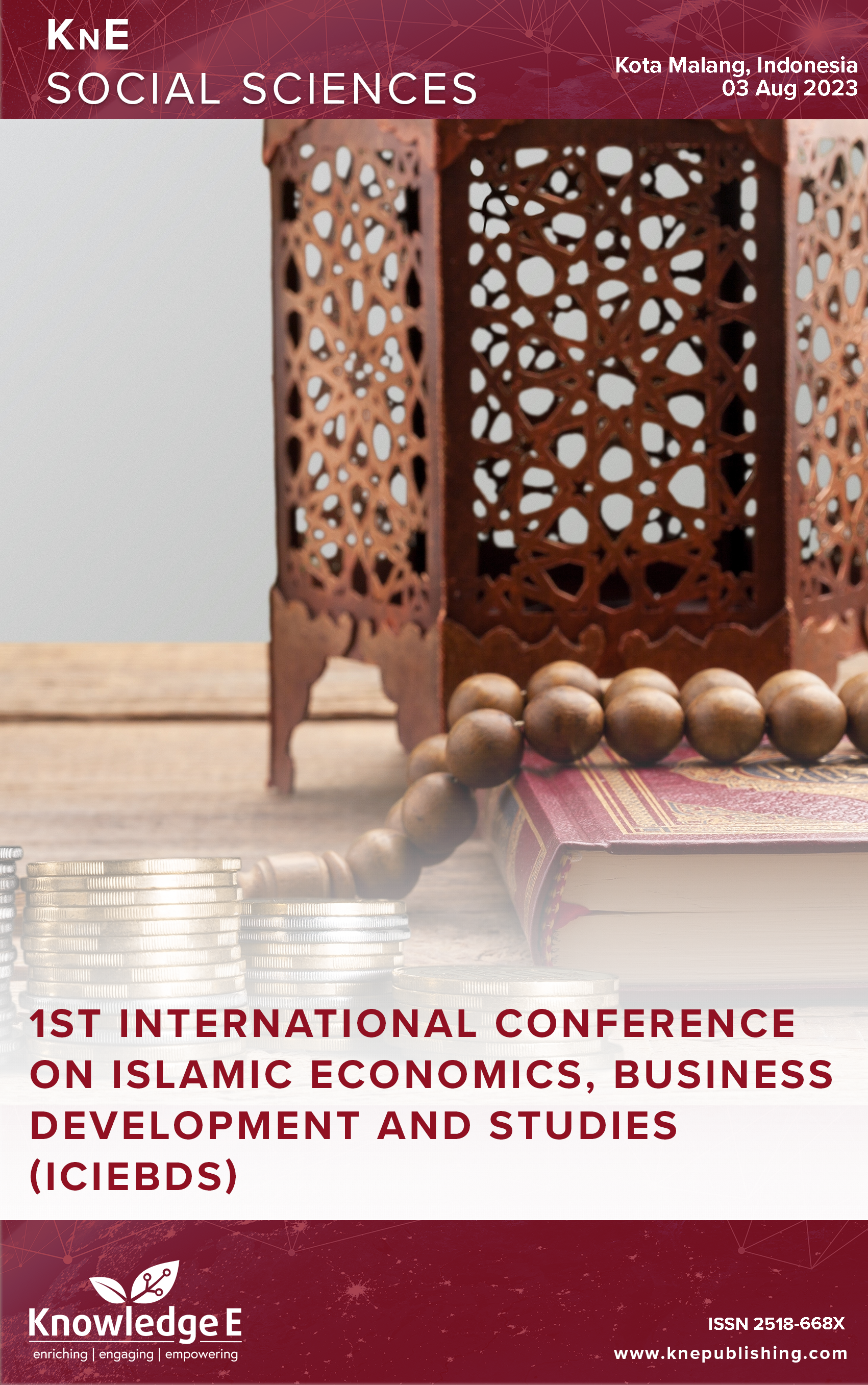The Impact of BMT on the Welfare of Market Traders in Kudus
DOI:
https://doi.org/10.18502/kss.v9i16.16282Abstract
The business world is an industrial world that is very supportive of the country’s economic recovery. Many Indonesians depend on the business industry, especially the lower class. Kudus City has long been a client of the City of Commerce, to be dependable on the commercial industry for their livelihood. However, the need for support for business development is still minimal. With these problems, BMT and even Islamic banks can become the main channel to support the development of the business sector in the market, which was initially a problem. This study aims to determine the effect of BMT on the welfare of market traders in Kudus City. This research uses descriptive qualitative research. Information was obtained from related journal references. Besides that, it can also be from online media.
Keywords: trade, industrial, BMT, Kudus
References
Aulia R. Peran Pemerintah Kabupaten Kudus dalam Pemberdayaan Ekonomi Masyarakat melalui SIDUKU Perspektif Maqashid Syariah. TAWAZUN J. Sharia Econ. Law. 2022;5(1):107. DOI: https://doi.org/10.21043/tawazun.v5i1.14014
Hidayat S. “Persepsi Masyarakat Terhadap Baitul Maal Wat Tamwil (Bmt) Dalam Pemberdayaan Ekonomi Masyarakat,” al-Uqud J. Islam. Econ. 2018;2(2):198. DOI: https://doi.org/10.26740/al-uqud.v2n2.p198-212
Hermawan K, Muhammad SS. Implementation of Shari’ah Marketing, 1st ed. Bandung: PT. Mizan Pustaka, 2006.
Sulisnaningsih D, Utomo CA, Ramadanie SK. Kolaborasi Perbankan Syariah dan Baitul Maal Wat Tamwil (BMT) dalam Pembaerdayaan UMKM. Al-Musthofa J. Sharia Econ. 2022;5(1):40–54.
U. Khotimah, “Peran Baitul Mal Wat Tamwil (BMT) Al-Ishlah Bobos Dalam Pemberdayaan UMKM (Studi Kasus Pada Masyarakat Desa Bobos Kec. Dukupuntang Kab. Cirebon).” IAIN Syekh Nurjati Cirebon, 2016.
Bistiana M, Indrarini R. Peran BMT Mandiri Artha Syariah Dalam Pemberdayaan UMKM di Kabupaten Bojonegoro Pada Masa Pandemi Covid-19. J. Ekon. Dan Bisnis Islam. 2021;4(2):85–97. DOI: https://doi.org/10.26740/jekobi.v4n2.p85-97
Sugianto S. “Pengembangan Baitul Maal Wat-Tamwil untuk Pemberdayaan Ekonomi Umat,” J. Pendidik. Dan Konseling. 2022;4(4):2177–83.
M. Arif and M. Sugianto, “Persepsi Masyarakat Terhadap Pendirian Baitul Mal Wat Tamwil (BMT) Di Desa Tasik Serai Timur Kecamatan Talang Muandau Kabupaten Bengkalis,” INVEST J. Inov. Bisnis dan Akunt., vol. 3, no. 1, pp. 69–75, 2022. https://doi.org/10.55583/invest.v3i1.244. DOI: https://doi.org/10.55583/invest.v3i1.244
N. Husna, “Ilmu kesejahteraan sosial dan pekerjaan sosial,” J. Al-Bayan Media Kaji. Dan Pengemb. Ilmu Dakwah, vol. 20, no. 1, 2014.
Adi IR. Ilmu Kesejahteraan Sosial dan Pekerjaan Sosial: Pengantar pada Pengertian dan Beberapa Pokok Bahasan. No Title; 2004.
J. S. Suriasumantri, “Ilmu dalam perspektif: Sebuah kumpulan karangan tentang hakekat ilmu,” 1985.
Pakpahan RH, Sihombing EN. Tanggung Jawab Negara Dalam Pelaksanaan Jaminan Sosial Responsibility State In The Implementation Of Sosial Security. J. Legis. Indones. 2018;9(2):163–74.
Z. Lessy, “keadilan sosial dan Kesejahteraan Sosial dalam Islam (Peran pekerja Sosial dalam Mewujudkan Keadilan & kesejahteraan Sosial), dalam Model-model Kesejahteraan social Islam Perspektif Normatif Filosofis dan Praktis,” Fak. Dakwah Jur. Pengemb. Masy. Islam UIN Sunan kalijag Yogyakarta Bekerjasama dengan, 2009.
Hascaryani TD, Manzilati A, Fadjar NS. Metafora Risk And Return Sebagai Dasar Pengembangan Baitul Maal Wa Tamwil (BMT) Yang Mandiri. J. Indones. Appl. Econ. 2011;5(1). https://doi.org/10.21776/ub.JIAE.005.01.6. DOI: https://doi.org/10.21776/ub.jiae.2011.005.01.3
Ulpah M. Konsep pembiayaan dalam perbankan syariah. Madani Syari’ah. 2020;3(2):147–60. DOI: https://doi.org/10.51476/madanisyariah.v6i2.538
Rahayu RS. Strategi Pemasaran Dalam Upaya Meningkatkan Jumlah Nasabah Tabungan Pada Bank Syariah Mandiri. UIN Ar-Raniry; 2020.
Garaika N, Damanah P. Metodologi Rset. Jakarta: CV Hira Tech; 2019.
Creswell JW, Creswell JD. Research design: Qualitative, quantitative, and mixed methods approaches. Sage publications; 2017.
S. Sugiyono, Metode Penelitian Bisnis. Bandung: CV. Alpabeta, 2012.
Mawadah S. Pedagang Tradisional Sebagai Pelaku UMKM Mitra Usaha BMT Walisongo dalam Pembiayaan Produktif. BISNIS J. Bisnis Dan Manaj. Islam. 2019;7(1):1. DOI: https://doi.org/10.21043/bisnis.v7i1.5189

